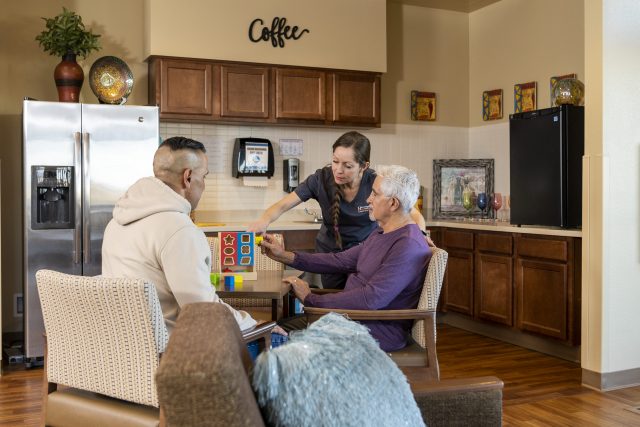Pam was approaching her 75th birthday. Her family decided to do something special for her this year and take her out to her favorite restaurant. But over the holidays, her family noticed that she was experiencing some memory loss. They decided to check with her caretaker. Pam still lived in her own home in Oklahoma City, but she did have someone to come check in with her to make sure she was taking her medications as prescribed. As it turned out, Pam’s caretaker was concerned. Pam was no longer was eating well and often forgot to cook for herself. Sometimes, she forgot to do basic things to care for herself. It was time to check in with her doctor. Dementia or Alzheimer’s disease can begin to effect people’s lives and be a source of concern for them and family members alike. That’s when finding out how supportive care services like Memory Care can be effective in helping your senior continue living a full and meaningful life.
It’s important to understand that dignity and independence is something we all need and strive for. And it’s no different for seniors who are slowly becoming dependent on others for care. Finding the proper supportive care team to care for your loved one may be exactly what they need. Here are some factors to consider when choosing next steps.
A Specialized Team
Memory deficits can be shocking and it may feel difficult to understand what your loved one is going through or know how to address their needs. What is the best way to slow the loss of cognitive abilities? What is normal to expect? Is it possible to care for someone and yet allow them to feel like they are still in control of their life? These are simple questions you may face when dealing with a family member struggling with memory loss. You can know that specialized help is available. A care team that can work with you and your senior’s physicians and who know exactly how to help those experiencing dementia or Alzheimer’s. Allow experts to assist with care and with basic day to day life.
Assistance with daily life. Pam wasn’t eating properly and often did not remember mealtimes. Proper nutrition and regular meals are very important. Memory Care staff can help your loved one establish a routine every day and stick with it. A daily routine can be comforting and make them to feel more secure. Family members can have peace of mind that their loved one is getting nutritious food as well as other daily care. As memory loss progresses, simple tasks such as dressing or showering may become more challenging. Memory Care staff are trained to recognize the level of care a person needs and notice subtle changes.
Daily activities. A senior home offering Memory Care may offer outings, daily exercise and mind stimulating activities specifically designed to address your family member’s needs. Sometimes it can be tricky to know what activities are mentally challenging and yet fun for a senior with memory loss. Allow a specially trained team to help guide you and your family member in these areas. Socially connecting in appropriate settings and keeping mentally active can help seniors feel a sense of purpose and progress.
A sense of independence. It’s important for many seniors to feel that they have their own home and are not dependent on family members for personal care. A home in an assisted living community can be the solution. And if your loved one is beginning to suffer from memory loss, Memory Care staff can help and make sure a person continues to feel as independent as possible. It’s still vital for family to remain as closely connected with their loved one as possible. Frequent visits, outings or even phone calls and cards remain very important. Family will always remain the center of a senior’s life. They need to feel loved and remembered. Connecting with your senior’s care team and medical providers is also very important. You’ll know how to best deal with daily situations and how to be a source of comfort to them.
Assisted living communities and nursing home environments all have their place in helping seniors navigate through their final years. Supportive care services can help your loved one deal with life changes and remain cared for as needed. Memory Care is very specific and specialized and can be a great resource to become familiar with as you and your family member enter new stages of life. You don’t have to go through this alone. Finding the proper tools and a caring team of professionals who are experienced with this type of condition can provide you with real solutions. Find out what local resources are available to you and schedule a tour to find out what level of care your loved one needs today.




It’s great to know that there are resources like Memory Care available for our loved ones. As a caregiver, it is comforting to know that there are services that help provide assistance to the seniors in our lives but also allow them to maintain as much of their independence as possible. Thank you for the great information!
Thank you, Melinda! And thank you for what you do as a caregiver. We are happy to hear you enjoyed our article!